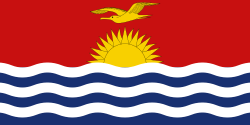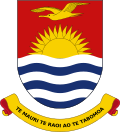Kiribati
island sovereign state in the central Pacific Ocean From Wikipedia, the free encyclopedia
Kiribati (/ˌkɪrɪˈbæs, -ˈbɑːti/) is an island country in the Pacific Ocean. It has 33 atolls, groups of tiny islands. The country is near the equator. Part of it is in Micronesia and part is in Polynesia. Its capital is South Tarawa, on the Tarawa atoll.
Republic of Kiribati Ribaberiki Kiribati | |
|---|---|
| Motto: "Te Mauri, Te Raoi ao Te Tabomoa" "Health, Peace and Prosperity" | |
| Anthem: Teirake Kaini Kiribati Stand up, Kiribati | |
 | |
| Capital and largest city | South Tarawa[1] 1°28′N 173°2′E |
| Official languages | English |
| Recognised national languages | Gilbertese |
| Ethnic groups (2000) | 98.8% Micronesian 1.2% others |
| Demonym(s) | I-Kiribati |
| Government | Parliamentary republic |
| Taneti Mamau[2] | |
• Vice-President | Teuea Toatu |
| Legislature | House of Assembly |
| Independence | |
• from the United Kingdom | 12 July 1979 |
| Area | |
• Total | 811 km2 (313 sq mi) (186th) |
| Population | |
• 2010 estimate | 103,500 (197th) |
• 2015 census | 110,136 |
• Density | 136/km2 (352.2/sq mi) (73rd) |
| GDP (PPP) | 2011 estimate |
• Total | $599 million[3] |
• Per capita | $5,721[3] |
| GDP (nominal) | 2011 estimate |
• Total | $167 million[3] |
• Per capita | $1,592[3] |
| HDI (2013) | 0.629 medium · 121st |
| Currency | Kiribati dollar Australian dollar (AUD) |
| Time zone | UTC+12, +13, +14 (GMT+12 to +14) |
| Driving side | left |
| Calling code | +686 |
| ISO 3166 code | KI |
| Internet TLD | .ki |
Kiribati used to be called the Gilbert Islands. The name "Kiribati" comes from the way local people say "Gilberts".[4] In 1892, the Gilbert Islands became a British protectorate with the Ellice Islands (now known as Tuvalu), together called Gilbert and Ellice Islands. Kiribati became an independent republic in 1979.
Tourism is an important industry. Most food comes from farming and fishing. People grow breadfruit, papayas, coconuts, sweet potatoes, and vegetables. The soil is not very good, but people use a special way of composting to make it better.[5]
The official languages of Kiribati are English and Gilbertese.
People
As of 2020, about 119,000 people live in Kiribati. This is up from 103,000 in 2010, 84,000 in 2000, and 72,000 in 1990. Of these people, 90% live on the Gilbert Islands, 10% live on the Phoenix Islands, and only 41 people live on the Line Islands. The government says that 59% of people live in urban areas.
Almost all people in Kiribati have a religion. The largest religions are Catholicism (59%), Kiribati Uniting Church (21%), Kiribati Protestant Church (8%), Mormon (5%), Bahai (2%), and Seventh-day Adventist (2%).[6]
History
The first people came to Kiribati sometime between 3000 BC[7] and 1300 AD.[8] It is not known where they came from. Before this time, the islands may have been underwater.[8]
European sailors saw the islands in the 1600s and 1700s. At this time, people only lived on the Gilbert Islands. (These islands were named after a British sailor, Thomas Gilbert.) In the 1800s, Europeans kidnapped many people and sold them as slaves. In 1886, the British Empire took the islands. The British tried to settle the Phoenix and Line Islands.[8]
During World War II, Japan took the islands. During the Cold War, the US tested nuclear weapons there. In 1979, Kiribati became independent. Kiribati signed a "Treaty of Friendship and Territorial Sovereignty" (also called the "Treaty of Tarawa") with the United States in 1979. The USA gave up its claims to the islands of Canton, Enderbury, Hull, Birnie, Gardner, Phoenix, Sydney, McKean, Christmas, Caroline, Starbuck, Malden, Flint, and Vostok in that treaty.[9]
Climate change
Global warming and climate change are having big effects on Kiribati. The islands are very low above the water. The average height is 3 metres above sea level. Because of global warming, the sea level is rising. Land is sinking under the ocean. In the future, there may not be enough land to grow food. Salt water is also filling up aquifers, where people store fresh water. Climate change causes unusual droughts and storms. These can make farming much harder.[10][11]
In 2012, the government purchased land on Fiji. This way, people from Kiribati could move there if needed.[12][13]
References
Other websites
Wikiwand - on
Seamless Wikipedia browsing. On steroids.


